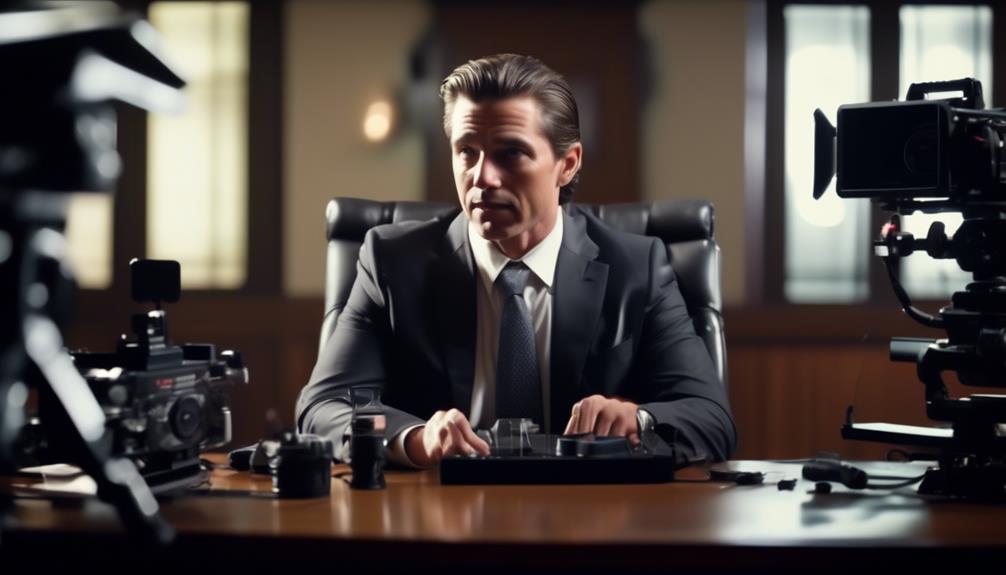They say a picture is worth a thousand words, but what about a video? In today's fast-paced legal world, attorneys need every advantage they can get to effectively represent their clients.
That's why adopting these video deposition tips is crucial for attorneys looking to stay ahead. From saving time and money to improving communication and accuracy, video depositions offer a host of benefits that can enhance the deposition process and ultimately lead to better outcomes for clients.
So, if you're ready to take your practice to the next level, join me as we explore the reasons why attorneys should embrace these video deposition tips.
Key Takeaways
- Video depositions save time and money by eliminating travel expenses and allowing for more efficient scheduling and flexibility.
- Video depositions enhance witness testimony by capturing body language and facial expressions, improving communication and accuracy in presenting trial testimony.
- Effective video depositions require preparation, coaching witnesses on conveying emotions through body language, and ensuring high-quality equipment and reliable internet connection.
- Technology plays a crucial role in video depositions, allowing for remote depositions, capturing non-verbal cues, enhancing accuracy and playback of testimony, and maximizing efficiency in the deposition process.
Benefits of Video Depositions for Attorneys
Video depositions offer numerous benefits to attorneys, including time and cost savings, improved communication, increased juror engagement, and enhanced accuracy of evidence.
The use of video in legal proceedings has revolutionized the way attorneys prepare for trials and present their cases in court. With the advent of remote video depositions and advancements in legal tech, attorneys can now conduct depositions without the need for all parties to be physically present in the same location. This not only saves time and money on travel expenses, but it also allows for more efficient scheduling and flexibility.
Additionally, video depositions provide attorneys with a wealth of non-verbal cues that can greatly enhance communication and understanding. By capturing the witness's facial expressions, body language, and tone of voice, attorneys can better assess their credibility and establish a connection with the jury.
The use of high-quality video also ensures that the evidence presented during depositions is clear, accurate, and admissible in court. This eliminates any potential misunderstandings or disputes that may arise from written transcripts or audio recordings.
Furthermore, video depositions can be invaluable in trial preparation. Attorneys can review and analyze deposition videos to identify key moments, inconsistencies, or areas of focus for cross-examination. By leveraging the power of virtual depositions and deposition videos, attorneys can streamline their trial strategies and increase their chances of success.
Enhancing Witness Testimony With Video Depositions
Now that we've explored the benefits of video depositions for attorneys, let's examine how they can enhance witness testimony in a compelling and persuasive manner.
Video depositions offer a unique opportunity to capture the witness's body language and facial expressions, which can be crucial in assessing their credibility. Non-verbal cues can often reveal more about a witness's true feelings and intentions than their words alone. By recording the witness's demeanor during the deposition process, video depositions provide a powerful tool for attorneys to present their case and bolster the credibility of their witnesses.
In addition to capturing body language, video depositions also allow for better communication and accuracy in presenting trial testimony. Attorneys can use visual aids and exhibits more effectively, ensuring that the jury fully understands the witness's testimony. Through the secure sharing of exhibits during the deposition, attorneys can seamlessly incorporate relevant documents, images, or videos to enhance the witness's testimony and make it more persuasive.
Furthermore, video depositions enhance the overall trial presentation and juror engagement. By presenting witness testimony in a visually engaging manner, attorneys can hold the jury's attention and make a lasting impression. The combination of visual and verbal cues creates a more immersive and memorable experience for the jurors, ultimately increasing the chances of a favorable outcome.
Key Tips for Effective Video Depositions
To ensure successful video depositions, attorneys must prioritize effective communication and body language preparation for witnesses. Remote video depositions have become increasingly common in law firms, thanks to the advancements in video conferencing technology. However, conducting depositions remotely requires careful attention to detail to ensure that the video and audio quality is clear and that all participants can effectively communicate.
One key tip for attorneys is to prepare witnesses for the unique challenges of video depositions. Unlike in-person depositions, non-verbal cues can be more difficult to interpret on video. Attorneys should coach witnesses on how to convey their emotions and intentions effectively through their body language, as it can significantly impact the perception of their deposition testimony.
Another important consideration is the equipment and internet connection used during the deposition. Attorneys should ensure that they've access to high-quality cameras, microphones, and reliable internet to avoid any disruptions or technical difficulties that could compromise the deposition.
Additionally, it's crucial to involve a skilled court reporter who can accurately transcribe the deposition testimony. This ensures that all details are captured and can be effectively used during trial strategies.
Importance of Technology in Video Depositions
As technology continues to shape the landscape of legal proceedings, the importance of utilizing advanced technology in video depositions can't be overstated. Video depositions are increasingly allowing attorneys to conduct remote depositions, thanks to the use of technology. This advancement has made it easier than ever to connect with witnesses, regardless of their location.
The use of technology in video depositions brings numerous benefits. Firstly, it enhances communication by capturing non-verbal cues that are crucial for understanding the witness's demeanor and credibility. This level of detail is often missed in traditional depositions conducted solely through written transcripts.
Additionally, technology improves the accuracy of video depositions. Video recordings provide an unbiased record of the witness's testimony, allowing for precise playback and the identification of any inconsistencies. This can be invaluable during cross-examination and can greatly impact the outcome of a case.
Furthermore, the use of technology in video depositions enhances juror engagement. Videos are more engaging than written transcripts, helping to keep jurors focused and interested in the proceedings. This increased engagement can lead to a stronger impact on jurors and a greater likelihood of a favorable outcome.
Lastly, technology in video depositions offers time and cost efficiency. Remote depositions eliminate the need for travel, reducing expenses and saving valuable time. Attorneys can conduct depositions from the convenience of their offices, increasing productivity and streamlining the legal process.
Maximizing Efficiency With Video Depositions
Maximizing efficiency with video depositions requires careful planning and utilization of advanced technology. By increasing the use of technology, attorneys can streamline the deposition process, saving both time and resources. With the right equipment and high-speed internet access, remote video depositions can be conducted seamlessly, eliminating the need for travel and reducing expenses. This not only benefits clients but also allows attorneys to focus on other important aspects of their cases.
One key advantage of video depositions is the ability to capture sworn testimony accurately. By utilizing video technology, attorneys can ensure that every word and gesture is recorded, providing a comprehensive and reliable record of the deposition. This can be particularly useful when assessing witness credibility and evaluating body language and non-verbal cues. Such insights can impact trial strategies and enhance juror engagement.
In addition, video depositions offer the convenience of having the entire trial team present remotely. Attorneys can collaborate and communicate effectively, even when physically separated. This maximizes efficiency by avoiding unnecessary delays and ensuring that everyone is on the same page.
Furthermore, video depositions can be crucial when dealing with defense witnesses. Attorneys can use video playback to catch inconsistencies and contradictions in testimony, strengthening their case. This technology also allows for easy presentation of exhibits, making complex information more accessible and understandable for judge and jury.
Conclusion
In conclusion, attorneys should embrace video depositions for their numerous benefits. By utilizing this technology, attorneys can save time and money while also enhancing communication, accuracy, and efficiency.
Video depositions offer flexibility, convenience, and improved access to documents and exhibits, ultimately leading to greater client satisfaction. By adopting these video deposition tips, attorneys can revolutionize the way they gather and present evidence, ultimately improving the overall legal process.

